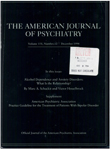Ethics complaints against female psychiatrists
Abstract
OBJECTIVE: The purpose of this study was to assess the prevalence and nature of investigated ethics complaints against female psychiatrists and to compare them with those against male psychiatrists. METHOD: The author, a member of the APA Ethics Committee, reviewed informal records kept by her during a period of just under 5 years. RESULTS: The Ethics Committee reviewed 259 complaints against men and 30 against women, constituting a prevalence rate of about 1.1% against male members and 0.4% against female members. Thirty-nine percent of the complaints against men and 60% against women were dismissed. Eighty-five sexual complaints against male psychiatrists and eight against female psychiatrists (of which two and six, respectively, were for homosexual behavior) were investigated. Also investigated were 19 complaints involving discourtesy or poor judgment against men and two against women, 21 of breach of confidentiality against men and three against women, and 23 involving financial matters against men and four against women. CONCLUSIONS: In this study of informal records, there were fewer investigated ethics complaints against female than against male psychiatrists, and more of these were dismissed after investigation. A greater proportion of the complaints of sexual exploitation made against women were for homosexual involvement. Cultural power differentials between genders may in part explain some of the data.
Access content
To read the fulltext, please use one of the options below to sign in or purchase access.- Personal login
- Institutional Login
- Sign in via OpenAthens
- Register for access
-
Please login/register if you wish to pair your device and check access availability.
Not a subscriber?
PsychiatryOnline subscription options offer access to the DSM-5 library, books, journals, CME, and patient resources. This all-in-one virtual library provides psychiatrists and mental health professionals with key resources for diagnosis, treatment, research, and professional development.
Need more help? PsychiatryOnline Customer Service may be reached by emailing [email protected] or by calling 800-368-5777 (in the U.S.) or 703-907-7322 (outside the U.S.).



